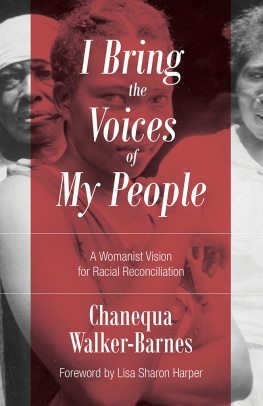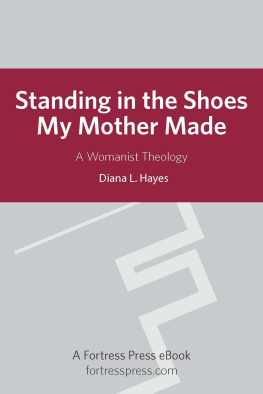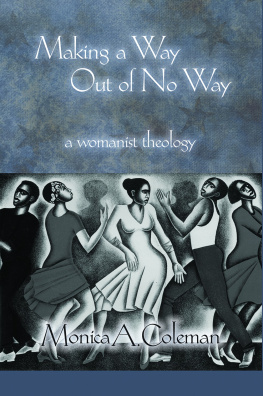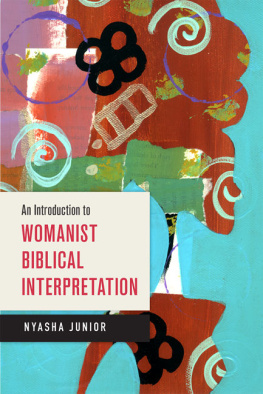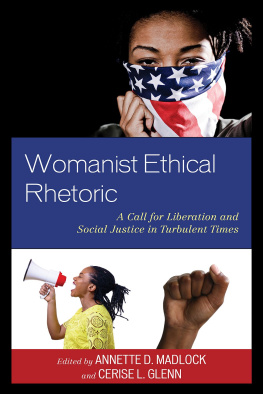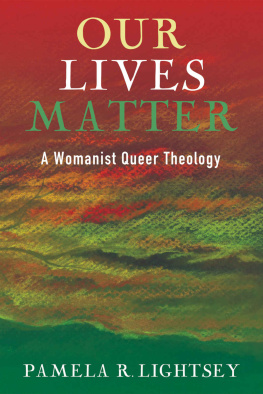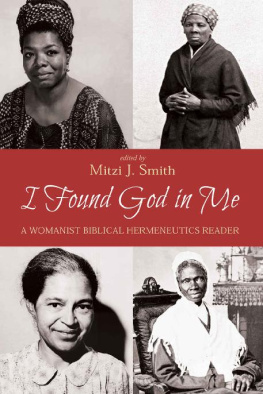Picking up where The Womanist Reader left off, Layli Maparyan presents a systematic analysis of womanism in The Womanist Idea. Emphasizing womanism as worldview, she situates spirituality at the heart of womanist thought and praxis, grounding a metaphysically oriented approach to social and ecological activism. Womanism, she argues, is spiritual movement, not just social movement. Case studies of five diverse spiritual activists from around the worldSister Chan Khong (Vietnam/France), Immacule Ilibagiza (Rwanda), Kiran Bedi (India), Pregs Govender (South Africa), and Wangari Maathai (Kenya)illustrate womanism in action. The animating impulse of womanism is LUXOCRACY, or rule by Light, an aspirational form of human social organization that recognizes the innate divinity of all human beings and, indeed, all life on Earth and the entire cosmos. Womanism, thus, invites a luminous revolution.
Layli Maparyan is Associate Professor of Womens Studies and Associated Faculty of African American Studies at Georgia State University. In 2006 (as Layli Phillips), she published The Womanist Reader, an anthology documenting the first quarter century of womanist thought from an interdisciplinary perspective. Since 2006, she has worked collaboratively with the University of Liberia to develop its inaugural Gender Studies Program, serving as a Fulbright Specialist in 2010. In 2009, she was awarded a Contemplative Practice Fellowship by the Center for Contemplative Mind in Society to study and teach womanist spiritual activism internationally.
First published 2012
by Routledge
711 Third Avenue, New York, NY 10017
Simultaneously published in the UK
by Routledge
2 Park Square, Milton Park, Abingdon, Oxon OX14 4RN
Routledge is an imprint of the Taylor & Francis Group, an informa business
2012 Taylor & Francis
The right of Layli Maparyan to be identified as author of this work has been asserted by her
in accordance with sections 77 and 78 of the Copyright, Designs and Patents Act 1988.
All rights reserved. No part of this book may be reprinted or reproduced or utilised in any
form or by any electronic, mechanical, or other means, now known or hereafter invented,
including photocopying and recording, or in any information storage or retrieval system,
without permission in writing from the publishers.
Trademark notice: Product or corporate names may be trademarks or registered trademarks,
and are used only for identifcation and explanation without intent to infringe.
Library of Congress Cataloging in Publication Data
Maparyan, Layli.
The womanist idea / Layli Maparyan.
p. cm. (Contemporary sociological perspectives)
Includes bibliographical references and index.
1. Spiritual life. 2. Womanism. 3. Mysticism. 4. Social change. I. Title.
BL624.M3444 2011
204.4082dc23
2011030148
ISBN: 978-0-415-88682-6 (hbk)
ISBN: 978-0-415-88683-3 (pbk)
ISBN: 978-0-203-13593-8 (ebk)
Typeset in Premier Garamond, Helvetica, and Univers 59 Ultra Condensed
by EvS Communication Networx, Inc.
Printed and bound in the United States of America on acid-free paper by
Edwards Brothers, Inc.
CONTENTS
Luxocracyrule by Lightis the animating idea of womanism and a vision for the future of humanity. It is predicated upon acknowledgment of the innate divinity and sacredness of all humans and, indeed, all creation and the entire cosmos. In order for Luxocracy to unfold as a liberating form of social organization on Earth, three conditions are necessary: commonweal, planetary identity, and luminous revolution.
Womanist Origins: Reading Alice Walker,
Chikwenye Okonjo Ogunyemi, and Clenora Hudson-Weems
Womanism is the ongoing outgrowth of womanists everyday thought and praxis. Although the womanist idea in its unnamed form has existed for centuries, if not millennia, contemporary womanism has been shaped by three notable spokespersons: Alice Walker, Chikwenye Okonjo Ogunyemi, and Clenora Hudson-Weems. This chapter examines originary writings on womanism by these three authors in order to locate the core ideas and tendencies of womanism, and also acknowledges the role of everyday women in constructing womanism by interpolating these three perspectives.
This chapter explores womanist metaphysics through an examination of womanist cosmology and ontology, womanist epistemology, womanist logic, and womanist axiology. This systematic approach produces two interrelated and novel conclusions: first, that womanism is a worldview (as distinct from a theory or ideology) and, second, that womanism is a spiritual movement (as distinct from a social movement).
Womanist Methodology: Transforming Consciousness,
Changing the World
Some womanist methods of social and ecological transformation are explained in detail in order to show the womanist idea in action. These methods include: self-care, spiritual practices, harmonization and coordination, dialogue, arbitration and mediation, mothering, hospitality, mutual aid and self-help, standing in, and fly-over. Illustrations of womanist methodology in action from around the world are presented.
This chapter explores the idea that the womanist idea is coconstituted by multiple spiritual and religious strands that converge at a point of dynamic coordination. Narratives of personal spiritual journeys are used to illustrate the eclectic, synthetic, holistic, personal, visionary, and pragmatic aspects of the spirituality that animates the womanist idea and, in turn, undergirds womanism as social/ecological transformation praxis.
Womanists take the invisible realm as axiomatic, and it forms a basis for a unique type of social and ecological change work. This chapter explores applied mysticism, applied metaphysics, and applied spirituality from a womanist perspective, with an emphasis on how these modalities of praxis can affect and effect social justice and ecological healing in the world.
Transforming War into Peace: Sister Chan Khong
and Learning True Love
Sister Chan Khong is a Vietnamese Buddhist nun, master of mindfulness, and lifetime peace activist. This chapter offers a close reading of her memoir, Learning True Love: Practicing Buddhism in a Time of War, with a focus on love-based, nondualistic, and mindful approaches to ending conflict and creating cultures of peace.
Immacule Ilibagiza survived the Rwandan genocide and subsequently developed a practice of radical forgiveness. This chapter offers a close reading of her memoir, Left To Tell: Discovering God Amidst the Rwandan Holocaust, with an emphasis on how womanist spiritual activism focuses on the transmutation of destructive emotions, or mental alchemy, as a foundation for social and political rebuilding in devastated communities.
Turning a Prison into an Ashram: Kiran Bedi


